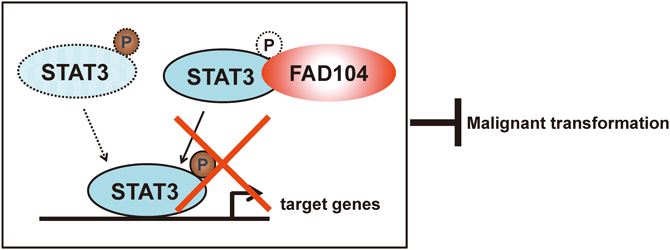Abstract
Anchorage-independent growth is one of the defining characteristics of cancer cells. Many oncogenes and tumor suppressor genes are involved in regulating this type of growth. Factor for adipocyte differentiation 104 gene (fad104) is a regulator of adipogenesis and osteogenesis. Previously, we reported that fad104 suppressed metastasis as well as invasion of melanoma cells. However, it is unclear whether fad104 is involved in malignant transformation, which is associated with metastasis. In this study, we revealed that fad104 negatively regulated the colony forming activity of melanoma cells. The presence of the N-terminal region of FAD104 was required for the regulation of malignant transformation of melanoma cells. In addition, the deletion mutant of FAD104 that contained the N-terminal region and transmembrane domain interacted with signal transducer and activator of transcription 3 (STAT3) and suppressed STAT3 activity. However, the deletion mutant of FAD104 lacking the N-terminal region did not influence the interaction with STAT3 or suppress the STAT3 activity. Moreover, FAD104 interacted with the C-terminal region of STAT3. In summary, we demonstrated that fad104 suppressed anchorage-independent growth of melanoma cells, and that the N-terminal region of FAD104 is essential for inhibiting malignant transformation and STAT3 activity.




